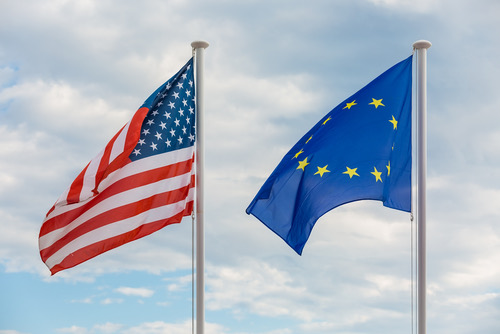
The Schrems II decision by the EU’s highest court (CJEU) invalidated the EU-US Privacy Shield. It declared valid, just about, SCCs (standard contractual clauses between data sender and recipient) for transfers or data exports outside the EU – but only if there’s enough practical checks and controls for “adequate protection” of personal data. The 64 million Euro question being, exactly what checks/controls will be considered good enough?
All that’s well known and well discussed. We’re eagerly awaiting the promised collective regulatory guidance from the European Data Protection Board (EDPB) on what these additional safeguards or additional measures, which the EDPB calls“supplementary measures”, might consist of. Hopefully their guidance will help to avoid fragmentation among national data protection supervisory authorities (SAs).
But let’s dissect another proposed “solution”: “data localization” (vs. “transfers”).
Germany’s Berlin SA in particular has taken a very strict approach, stating that:
- If a “third country” receiving transferred personal data has laws permitting governmental access to the data that goes beyond what EU law permits, then
- SCCs can’t be used for that export, and
- Personal data already transferred to that country must be “retrieved” or recovered – i.e. onshoring / reshoring or “repatriation” of that data, if you like; and
- Controllers who transfer personal data to the United States of America, especially when using cloud services, are now “required” to switch “immediately” to service providers “in the EU” or “in” a country with an adequate level of data protection.
- Localization of personal data, in terms of the geographical location of physical storage / hosting, i.e. local location of servers and other equipment used to process personal data; and
- Using only providers “in” the EU or another “adequate” country to host or process personal data. (We’ll assume that “in” means “incorporated in”, i.e. registered under the laws of an EU Member State or other “adequate” country.)
But – even EU-incorporated service providers might want to expand outside the EU. In fact, the EU would quite like them to be successful enough to be able to sell their goods and services abroad, and make money from non-EU countries. Go EU businesses! And some third countries may say: if you want to do business in our country, then you have to comply with our laws. Including remotely accessing personal data physically located in the EU, and giving it to us if we require that. If not, we’ll issue criminal proceedings against your directors in our country. They have effective jurisdiction over those EU providers. As does the provider’s EU Member State.
OK, so let’s tell EU-incorporated businesses not to leave the EU then. Indeed, why not stay within the borders of just Germany? It’s a big bad world out there. It’s so much safer to shrink down and withdraw, just retreat home.
So you really really think that would protect personal data best? And that, umm, this would actually work to stop third countries’ intelligence agencies from getting hold of intelligible EU data?
Of course. Data is safest on EU soil, in EU hands. EU intelligence agencies would never seek to access EU data so broadly. Or if they did, surely they’d never share any of it with US or other third country authorities. Nuh huh.
Errr…..
Sure, the above is a bit tongue in cheek. And it’s certainly not trying to support over-broad US surveillance laws.
But we mustn’t lose sight of what should be the first, and ultimate, goal of data protection laws: protection of personal data and privacy.
Is the best way to do this really to have the highest EU court tell another (sovereign) country to, effectively, change its own national laws because they’re not good enough by another region/country’s standards, and put EU (and non-EU) organisations with international or cross-border operations in the impossible position of having to choose which country’s laws to break?
The core issue should be, not the adequacy of a third country’s laws, but the adequacy of protection for personal data there. Again, those two concepts aren’t actually the same thing, even though the first can affect the second.
The GDPR’s predecessor, the Data Protection Directive, also restricted “transfers” except to third countries that ensured an “adequate level of protection”.
Now, under the UK implementation of the Directive, the UK Information Commissioner’s Office (ICO) had previously allowed controllers to conduct their own assessmentof the adequacy of protection in a third country:
“Organisations exporting data may be able to ensure that the personal data are protected by means of technical measures (such as encryption or the adoption of information security management practices such as those in ISO27001/ISO27002″.
Art.25(2) of the Directive listed particular factors to be considered when assessing the adequacy of protection. It explicitly mentioned “security measures which are complied with in that country”. So inadequate laws did not necessarily mean inadequate protection – adequate security measures like encryption, perhaps along with other practical measures, might be enough to overcome inadequate laws in a third country.
In particular, if a third country authority can’t access intelligible personal data because it’s been encrypted and the authority can’t decrypt it, then the risk to data subjects’ rights from third country governmental access has surely been mitigated, if not eliminated. The data has been adequately protected against access by those third country authorities. Data subjects don’t need rights against third country authorities if their data can’t even be read by those authorities. If authorities can’t even read intelligible data, then they can’t use it or do anything with it against the interests of the data subjects.
In Schrems II the CJEU said:
“It is therefore, above all, for that controller or processor to verify, on a case-by-case basis and, where appropriate, in collaboration with the recipient of the data, whether the law of the third country of destination ensures adequate protection, under EU law, of personal data transferred pursuant to standard data protection clauses, by providing, where necessary, additional safeguards to those offered by those clauses” (para.134).
So, it’s gone full circle. We’re back to each transferring entity that wants to use SCCs (or Art.47 binding corporate rules i.e. BCRs, according to the EDPB) to send or transmit personal data to, or make it accessible from, a third country, effectively having to make its own adequacy assessment or adequate protection assessment (“APA”, to coin an acronym, as “AA” may be a bit ambiguous).
Now, that vital sentence could have been a lot more clearly phrased (can other language versions assist?). How can a transferor “verify” “whether” third country law ensures adequate protection “by providing, where necessary, additional safeguards”? You can’t verify laws’ adequacy by implementing additional safeguards. But, you can sometimes counteract “inadequate” laws by providing additional safeguards or measures, whether technical or organisational – i.e. by using suitable technologies, policies and/or processes and practices. Like encryption. Surely that must be what the CJEU meant.
When assessing the “appropriate safeguards” under Art.46GDPR (including use of SCCs) needed to provide Art.45(1) “adequate protection”, the CJEU in Schrems II also stated:
“The assessment required for that purpose in the context of such a transfer must, in particular, take into consideration both the contractual clauses agreed between the controller or processor established in the European Union and the recipient of the transfer established in the third country concerned and, as regards any access by the public authorities of that third country to the personal data transferred, the relevant aspects of the legal system of that third country. As regards the latter, the factors to be taken into consideration in the context of Article 46 of that regulation correspond to those set out, in a non-exhaustive manner, in Article 45(2) of that regulation.” (para.104).
Guess what? GDPR Art.45(2)(a), on factors that the European Commission must consider when assessing the adequacy of the level of protection in a third country, also mentions “security measures… which are complied with in that country”. Just as in the Directive’s Art.25(2).
This means that the door is potentially open for the EDPB to allow encryption as a “security measure” that could ensure adequate protection in a third country with otherwise “inadequate” laws. I reiterate, the goal isn’t adequacy of laws, it’s adequacy of protection for personal data.
So it’s heartening that the EDPB in its FAQs on Schrems IIstated:
“The EDPB is currently analysing the Court’s judgment to determine the kind of supplementary measures that could be provided in addition to SCCs or BCRs, whether legal, technical or organisational measures, to transfer data to third countries where SCCs or BCRs will not provide the sufficient level of guarantees on their own.
The EDPB is looking further into what these supplementary measures could
consist of and will provide more guidance.”
I’m not saying encryption is a panacea. Not at all. Some intelligence agencies undoubtedly have the capability to decrypt certain encrypted data. Or, the encryption applied could be weak – cracked or bad algorithm used, too short a key used. Even with strong encryption, the service provider might have the key because it needs it to in order to process the data as expected by the customer. Most data operations can’t be performed on encrypted data, not yet anyway, or if they can it would be unfeasibly slow currently, so the data has to be decrypted first before those operations can be performed. At which point the provider has access to intelligible data. Which can then be disclosed to authorities. And obviously the proper implementation of encryption in practice in concrete situations is very important, along with other security measures like access controls.
But, if everyone everywhere strongly encrypts data as much as possible, including in transmission as well as in storage, that would make it a lot more difficult for intelligence agencies – admittedly EU as well as third country – to obtain intelligible, usable data. Indeed, in its cloud computing guidance, the Article 29 Working Party (the EDPB’s predecessor) recommended that “Encryption of personal data should be used in all cases when “in transit” and when available to data “at rest””. Not just when using non-EU cloud service providers.
To curb excessive state surveillance in practice, those who are against such surveillance should be promoting encryption or other strong forms of pseudonymisation, rather than forcing transferors to analyse and assess the “adequacy” of third country laws. As others have noted, many transferors who use US or other non-EEA service providers are SMEs. Most of them aren’t lawyers and can’t afford lawyers, let alone expensive lawyers expert in the surveillance laws of all relevant third countries. And what if regulators or courts then disagree with their good faith assessments?
This highlights one problem with the GDPR’s drafting, and some lawmakers/regulators’ approach to it. To paraphrase Maslow, if all you’re used to is nails, then you’ll tend to think that a hammer must be the only, or at least the best, tool to use. But, for screws, wouldn’t you want to use a screwdriver?
Lawmakers, regulators and judges are used to the tools of law: legislation, regulation, contract, legal obligations and liabilities. Many, dare I say most, of them aren’t as familiar or comfortable with the tools of technology, and may not be inclined to trust the efficacy of tools that aren’t tools of law.
But my point is that, to protect transferred personal data adequately, we ought to use all the tools available. We can’t just rely on third country laws alone (or dismiss their laws as inadequate, so that transfers there are prohibited absolutely).
We need to use technical and organisational measures too to protect personal data, whether the data’s physically located in the EU or transferred outside it. Saying that only the tools of law are good enough for transfers, and that technical tools like encryption don’t count, would be like trying to protect transferred personal data with one arm tied behind your back, to use yet another analogy.
For transfers, the GDPR should be encouraging, and interpreted as encouraging, the use of technical and organisational safeguards – not just the tools of law. If technical and/or organisational measures can provide adequate protection in a third country, enough to provide “essentially equivalent” guarantees of protection for the relevant personal data and data subjects, then it shouldn’t be necessary to make transferors analyse the laws of the third country too!
Read literally, Art.46 states that appropriate safeguards “may” be provided for by SCCs or the other safeguards listed in Art.46(2)(a)-(f). It doesn’t actually say that Art.46(2) is exhaustive; it doesn’t say that the safeguards listed there are the only possible safeguards.
However, Art.46(1) requires all safeguards to be “on condition that enforceable data subject rights and effective legal remedies for data subjects are available”. Even though, logically, they wouldn’t need rights or remedies against authorities who can’t access intelligible data. That condition isn’t necessary to protect data subjects from those who can’t access usable data, but it reflects the hammer/nail issue above.
Similarly, if codes of conduct or certification mechanisms get approved for transfers under Art.46(2), “binding and enforceable commitments of the controller or processor in the third country to apply the appropriate safeguards, including as regards data subjects’ rights” are still required. Even if the personal data has been encrypted or otherwise pseudonymised in such a way that the third country recipient itself can’t access intelligible data, e.g. for pure hosting or storage only. If they want the business, they’ll just have to suck it up and agree to those “binding and enforceable commitments”, so third country recipients who offer such codes or certifications may still have to sign something like SCCs. (And, to be fair, those commitments could cover other security measures such as backups for integrity, not just confidentiality.)
Let’s hope that when the GDPR is updated…
Understanding the Dutch Approach to GDPR Fines: Why Canadian Companies Need to Pay Attention
⚠️ IMPORTANT UPDATE This article accurately describes the Dutch AP’s pioneering…















